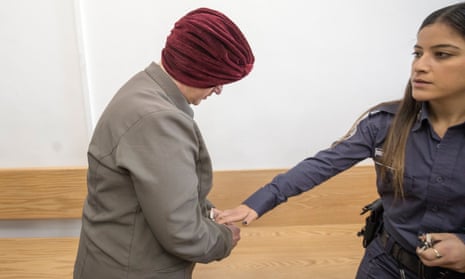There are, today, few crimes more universally reviled than the sexual abuse of children.
Our disgust goes beyond the violation and lifelong emotional scars, to the nature of betrayal. The very people entrusted with protecting the most vulnerable have become the source of their worst nightmares. The royal commission highlighted the cultures of denial, concealment and enabling that allowed perpetrators to keep abusing and escape justice.
This is perhaps why the Malka Leifer case, more than any other issue, has shaken the Australian Jewish community’s faith in Israel’s commitment to justice and made it more permissible to openly criticise the government. This is no small change.
Over the years the community leadership has been unwavering in its support of Israel, regardless of its government’s actions. While the Palestinian occupation has increasingly stirred feelings of doubt, there has been an implicit acceptance by the heartland of Australian Jewry that the conflict is intractable, everyone’s hands are dirty and that Israeli governments should not be judged any more harshly than others around the world.
But Leifer’s case is different. It’s personal, we know the alleged victims, she ran away. The Israeli government, or at least the health minister, has demonstrated its contempt for the most basic of human injustices – the alleged assault of young children. More than that, its health minister has been charged with interfering on behalf of Leifer.
The former principal of Melbourne’s ultra-Orthodox Adass Israel school faces extradition to Australia on 74 charges of sexually assaulting female students during her time as principal. The school management helped spirit her to Israel in 2008.
Leifer’s lawyers claim she suffers from paralysing anxiety and is mentally unfit to face court; yet despite clear-cut video evidence that she is going about her life as normal, judge after judge has been unable to rule that she is fit to be extradited, and face Australian justice. Her case has dragged on for five years, involved 57 hearings and more than 30 psychiatrists.
Some of Leifer’s alleged victims, led by the Melbourne woman Dassi Erlich and her sisters, Nicole Meyer and Elly Sapper, have mounted a courageous campaign to have her extradited. Their advocacy has given the case a high profile within the local Jewish community.
This year that pressure intensified when the Israeli health minister, Yaacov Litzman, also an ultra-Orthodox Jew, was charged with pressuring psychiatrists to alter their reports to find Leifer was mentally unfit to stand. The government was accused of being complicit in the cover-up; Leifer’s case grew into a major Israeli news story.
The images of Malka Leifer, looking dull and downcast to avert the media’s gaze, Dassi Erlich speaking defiantly, and now the white-bearded Litzman, still the heath minister, have become commonplace in Jewish social discourse.
Last week the farce reached a new low when an Israeli judge allowed Leifer to be released on bail from house arrest to stay with her sister, pending the next hearing in December.
Collectively, these revelations have left Australian Jews disillusioned on a number of levels. Firstly, with the integrity of Israel’s justice system and the elected politicians who administer it. The message has been clear: they don’t care, they don’t treat allegations of sexual child abuse seriously.
Sign up to receive the top stories from Guardian Australia every morning
Secondly, with the status of ultra-Orthodox (Haredi) Jews. For many years, even as the Haredim have become more involved in government, many secular Jews held that although their values were out of touch with modern life, they should be accepted as part of the Jewish social fabric. But the deceit that enabled Leifer to allegedly abuse in the first place, then flee, and receive support from a government minister, has corroded that tolerance. Loyalty cannot trump integrity.
Private disquiet has been given public voice through the Zionist Federation of Australia, the national custodian of the relationship between Australian Jews and Israel. The ZFA has become outspoken in its criticism of the Leifer case, as has the Australian Israel Jewish Affairs Council, sending a strong signal to other Jewish community groups, including fundraising organisations.
Among a welter of protests from Australian politicians, Dave Sharma, the former ambassador to Israel who is now the Liberal member for the eastern Sydney seat of Wentworth, said the decision “defies explanation”. Sharma was strongly supported by Jewish community leaders in this year’s federal election, and his comment echoed the depth of disappointment in Jewish circles.
In the wake of last week’s bail verdict, the Israeli newspaper Haaretz reported that, according to diplomatic sources, the case could cause a serious rift in Israel-Australia relations and prompt sections of the Australian Jewish community to consider cutting off donations.
While it is too soon to gauge whether either of these allegations will be borne out, there is now a fresh climate for Australian Jewish fundraising groups to review their priorities and decisions, both in terms of speakers and where their fundraising dollars are targeted.
The longer Malka Leifer remains in Israel, the louder the misgivings will become.
Michael Visontay is editor of the Jewish digital publication Plus61J Media, and is co-author, with Manny Waks, of Who Gave You Permission? The Memoir of a Child Sexual Abuse Survivor Who Fought Back
